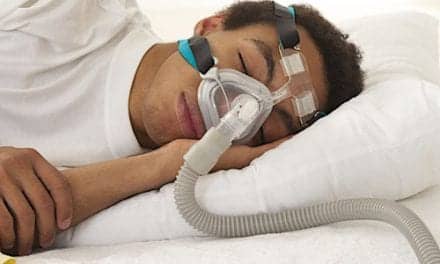An alarm system being developed by researchers at University of North Texas (UNT) Health Science Center and The University of Texas at Arlington could make it easier for patients with sleep apnea who use PAP (positive airway pressure) therapy to get a good night’s rest.
The user-friendly system alerts the individual whenever there’s an airflow leak in their PAP, says Brandy M. Roane, PhD, CBSM (pictured), assistant professor of internal medicine. Users will be able to decide if they want to be alerted by sound, lights, or vibration, or through an app that tells them what’s wrong and the best way to address it.
The alert system is being developed through a Texas Medical Research Collaborative (TMRC) grant. The TMRC is a research partnership among universities, healthcare providers, and corporations supporting healthcare. “Some people may want to use a song or ring tone that is less disruptive to a bedmate,” Roane says in a release. “Someone who is deaf may prefer to get a visual cue, such as color popping up on their phone.”
The alert system might be just what it takes to motivate the roughly 50% of patients with sleep apnea who give up on the treatment to keep using it.
An air-flow leak is one of the most common reasons people stop using the nighttime masks, says Eileen Clements, director of research at The University of Texas at Arlington Research Institute. “The system we developed at the research institute will alert the user if there is an air-flow leak so that the user can make an informed adjustment to the mask or system or sleep position or some other behavior that helps them get the most benefit from their PAP therapy,” Clements says. “Of course, the adjustment has to be made by the user, but they would utilize information from the system as well as guidance from their therapist or doctor.”
“The hope is that people who use this will benefit from PAP therapy by waking up with more energy,” Roane says. “And they won’t fall asleep at work or while they are driving.”
Photo courtesy University of North Texas Health Science Center





I could really benefit from this warning. I am currently teaming a service animal to wake me up at the sound of an air leak from the mask
thank you so much! perhaps a Bluetooth interface to the iPhone or google phone might work well
I have Sleep Apnea
I Have a son with down syndrome and autism who uses a CPAP but continually takes it off at night. An alarm system would be beneficial To alert us when he has taken it off. Short of sitting by his bedside all night long would be the only other way to keep it on him. He does not fight us having it on and cooperates with it it’s just keeping it on
So – Where is this project now?
Note above comments are from 2016.
I’m a caregiver for an Apnea patient and would want one NOW.
Even happy to do a beta test.
I really need that alarm
Where can I buy one?
My husband is a stroke patient & is currently having many problems with his new Respironics Air Sense 10.
He really needs his cpap machine, and could really use some sort of an alert system to indicate a
Malfunction, a mask leak, etc. He loves sleeping with his cpap machine but is currently having so many
Problems with discomfort in airflow, that I have not let him use the machine for fear of a serious problem
Happening during the night. He would benefit a great deal from having a special alert on the machine.
Something serious could happen to the person without anyone knowing.